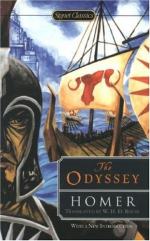“Great deeds, O friends! this wondrous man has
wrought,
And mighty blessings to his country brought!
With ships he parted, and a numerous train,
Those, and their ships, he buried in the main.
Now he returns, and first essays his hand
In the best blood of all his native land.
Haste, then, and ere to neighbouring Pyle he flies,
Or sacred Elis, to procure supplies;
Arise (or ye for ever fall), arise!
Shame to this age, and all that shall succeed!
If unrevenged your sons and brothers bleed.
Prove that we live, by vengeance on his head,
Or sink at once forgotten with the dead.”
Here ceased he, but indignant tears let fall
Spoke when he ceased: dumb sorrow touch’d
them all.
When from the palace to the wondering throng
Sage Medon came, and Phemius came along
(Restless and early sleep’s soft bands they
broke);
And Medon first the assembled chiefs bespoke;
“Hear me, ye peers and elders of the land,
Who deem this act the work of mortal hand;
As o’er the heaps of death Ulysses strode,
These eyes, these eyes beheld a present god,
Who now before him, now beside him stood,
Fought as he fought, and mark’d his way with
blood:
In vain old Mentor’s form the god belied;
’Twas Heaven that struck, and Heaven was on
his side.”
A sudden horror all the assembly shook,
When slowly rising, Halitherses spoke
(Reverend and wise, whose comprehensive view
At once the present and the future knew):
“Me too, ye fathers, hear! from you proceed
The ills ye mourn; your own the guilty deed.
Ye gave your sons, your lawless sons, the rein
(Oft warn’d by Mentor and myself in vain);
An absent hero’s bed they sought to soil,
An absent hero’s wealth they made their spoil;
Immoderate riot, and intemperate lust!
The offence was great, the punishment was just.
Weigh then my counsels in an equal scale,
Nor rush to ruin. Justice will prevail.”
His moderate words some better minds persuade:
They part, and join him: but the number stay’d.
They storm, they shout, with hasty frenzy fired,
And second all Eupithes’ rage inspired.
They case their limbs in brass; to arms they run;
The broad effulgence blazes in the sun.
Before the city, and in ample plain,
They meet: Eupithes heads the frantic train.
Fierce for his son, he breathes his threats in air;
Fate bears them not, and Death attends him there.
This pass’d on earth, while in the realms above
Minerva thus to cloud-compelling Jove!
“May I presume to search thy secret soul?
O Power Supreme, O Ruler of the whole!
Say, hast thou doom’d to this divided state
Or peaceful amity or stern debate?
Declare thy purpose, for thy will is fate.”




